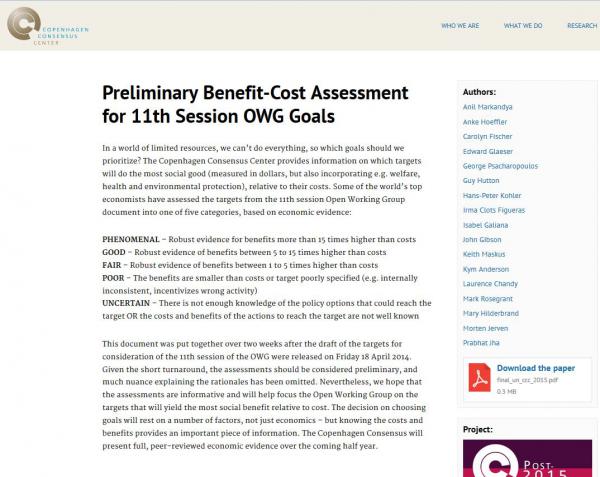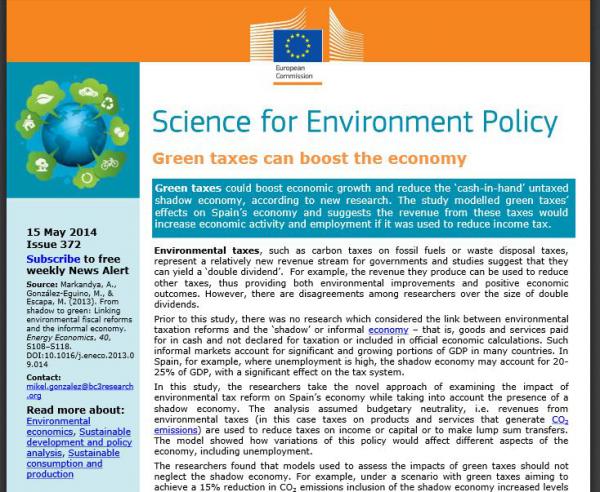- Home
- Press Area
From January 2016 onwards all the BC3 News are available at news.bc3research.org.
Please find copied below the News previous to January 2016
Press Area
Onda Vasca; BC3 reconocido como “think tank” más influyente en materia de economía y CC
Thursday, 07 August 2014
Entrevista radiofónica ofrecida por Ibon Galarraga, director adjunto del BC3 (Basque Centre for Climate Change) a La Tarde en Euskadi (Onda Vasca), con motivo del reconocimiento obtenido por BC3 como el segundo “think tank” más influyente del mundo en materia de economía y cambio climático.

Fuente Onda Vasca [La Tarde en Euskadi]
BC3 PRENTSA OHARRA_20140709
Wednesday, 09 July 2014
"BC3 da munduko bigarren Think Tank-ik eraginkorrena Klima-Aldaketaren ekonomia eta politikan"
BC3 - Basque Centre for Climate Change euskal erakundeak bigarren postua lortu du Munduko ICCG (International Center for Climate Change Governance). Think Tank-en Sailkapenean, aurrea hartuz Klima-Aldaketaren ekonomia eta politikan lan egiten duten mundu osoko 293 erakunde pribatu eta publikori.
Europa mailako lidergoari eusteaz gain, BC3-k bigarren posiziora egin du jauzi munduko Top Class modura.
BC3 Prentsa Oharra_20140709 Jeitsi
NOTA DE PRENSA BC3_09072014
Wednesday, 09 July 2014
"BC3, segundo Think Tank más influyente del mundo en economía y política del Cambio Climático"
El BC3, Basque Centre for Climate Change, ha obtenido la segunda posición en el Ranking Mundial de Think Tanks de ICCG (International Center for Climate Change Governance), por delante de 293 organizaciones públicas y privadas que trabajan en el ámbito de la economía y política del Cambio Climático.
BC3 revalida su posición de líder en el ámbito europeo y avanza a la segunda posición del Top Class mundial.
BC3 PRESS RELEASE_20140709
Wednesday, 09 July 2014
"BC3, the world’s second most influential Think Tank in the field of climate change economics and policy"
The BC3, Basque Centre for Climate Change, has been ranked second place in the Climate Think Tank Ranking of the ICCG (International Center for Climate Change Governance) , ahead of 293 public and private organisations working in the field of climate change economics and policy. BC3 confirms its leadership position in Europe and moves up to second place in the World Top Class ranking.
Preliminary Benefit-Cost Assessment for 11th Session OWG Goals
Thursday, 05 June 2014
Some of the world’s top economists, among which it is Prof. Anil Markandya, Scientific Director of BC3, Basque Centre for Climate Change, have assessed the targets from the 11th session Open Working Group document into one of five categories, based on economic evidence: Phenomenal, Good, Fair, Poor and Uncertain.

Media coverage of this news. The New York Times
FLAGSHIP project just launched its bi-annual Newsletter
Wednesday, 04 June 2014
FLAGSHIP (Forward Looking Analysis of Grand Societal challenges and Innovative Policies) project has just released its Bi-annual Newsletter Flagship newsletter3 june14.
More information about this project and BC3´s contribution here
The European Commission selects a BC3 research for its quality and policy relevance
Friday, 16 May 2014
The European Commission´s "Science for Environment Policy" weekly News alert selected in its latest bulletin, for quality and European policy relevance, a paper co-authored by BC3 researchers, Prof Anil Markandya and Dr. Mikel-Gonzalez de Eguino;"From shadow to green: Linking environmental fiscal reforms and the informal economy"and published in the prestigious scientific journal Energy Economics (DOI:10.1016/j.eneco.2013.0).
This weekly News Alert forms the cornerstone of the Science for Environment Policy service of the European Commission and summarises scientific studies in easy-to-read language with policy implications clearly highlighted. The studies are carefully selected for quality and European policy relevance.
Green taxes can boost the economy
Green taxes could boost economic growth and reduce the 'cash-in-hand' untaxed shadow economy, according to new research. The study modelled green taxes' effects on Spain's economy and suggests the revenue from these taxes would increase economic activity and employment if it was used to reduce income tax.
[http://ec.europa.eu/environment/integration/research/newsalert/newsalert.htm ]

[http://ec.europa.eu/environment/integration/research/newsalert/pdf/372na4.pdf]
Environmental taxes, such as carbon taxes on fossil fuels or waste disposal taxes,represent a relatively new revenue stream for governments and studies suggest that they can yield a ‘double dividend’. For example, the revenue they produce can be used to reduce other taxes, thus providing both environmental improvements and positive economic outcomes. However, there are disagreements among researchers over the size of double dividends.Prior to this study, there was no research which considered the link between environmental taxation reforms and the ‘shadow’ or informal economy that is, goods and services paid for in cash and not declared for taxation or included in official economic calculations. Such informal markets account for significant and growing portions of GDP in many countries. InSpain, for example, where unemployment is high, the shadow economy may account for 20-25% of GDP, with a significant effect on the tax system.
In this study, the researchers take the novel approach of examining the impact of environmental tax reform on Spain’s economy while taking into account the presence of a shadow economy. The analysis assumed budgetary neutrality, i.e. revenues from
environmental taxes (in this case taxes on products and services that generate CO2emissions) are used to reduce taxes on income or capital or to make lump sum transfers. The model showed how variations of this policy would affect different aspects of the economy, including unemployment. The researchers found that models used to assess the impacts of green taxes should not neglect the shadow economy. For example, under a scenario with green taxes aiming toachieve a 15% reduction in CO2 emissions inclusion of the shadow economy increased levelsof prosperity and living standards (welfare) to 3% higher than models which did not include the shadow economy. Official GDP was also 7% higher, and the unemployment rate was 3%
lower. The authors also found that the size of the shadow economy directly affected the size of the welfare increase seen, i.e. the bigger the shadow economy, the greater the increasein welfareas a result of green taxes.
These effects were found to be driven, in part, by the increased tax paid by informal workers through consumption of services and products which included environmental taxes.Additionally, using green taxes to ease income tax meant that taxes were recovered more efficiently, lowering the strain on public finances. This translates to an overall increase in economic activity, reduced unemployment and reductions of the informal economy.The results, combined with similar findings from other studies, led the authors to conclude that replacing a portion of income tax with green taxes is one of the best options for environmental fiscal reforms. However, they also mention that there are a number of issues arising from such an approach. For example, environmental taxes have the potential to affect the poorest members of society most, as they spend a greater proportion of their income on energy than wealthier members
Elisa Sainz de Murieta ikerlaria Hamaika Telebistan denboraldien inpaktuetaz
Thursday, 20 February 2014
BC3 ko ikerlaria den Elisa Sainz de Murietak, Hamaika Telebistako, Atik Ztara saioan parte hartu zuen azken denboraldien inpaktuen gaineko azterketa egiteko.
Entrevista realizada por el Dr. Mikel González Eguino a "El Diario Vasco"
Sunday, 27 April 2014
Entrevista ofrecida por el Dr. Mikel González Eguino a El Diario Vasco el 17/04/2014. "El futuro se llama océano ,Euskadi se va a ver obligada a adaptarse a la creciente influencia del mar. La subida del nivel del agua se ha acelerado en el último siglo debido a la acción del hombre y al cambio climático"
Fuente El Diario Vasco: Ver noticia
Los impactos que estamos sufriendo son aún gestionables
Sunday, 30 March 2014
Entrevista ofrecida por el Dr. Ibon Galarraga al medio, DEIA, sobre los impactos del cambio climático y las necesarias medidas de adaptación a la misma "Los impactos que estamos sufriendo son aún gestionables siempre y cuando se apueste por políticas climáticas ambiciosas".
Fuente DEIA: Ver noticia

Ibon Galarraga ikerlaria "Mezularia" irrati saioan neguko itsas deboraleaz
Friday, 21 March 2014
Aitziber Sarobe biologoarekin, Ibon Galarraga ingurumen ekonomialariarekin eta Joseba Azkarraga soziologoarekin solasaldi monografikoa egin dugu Mezularian neguko itsas denboralearen kontura.

Iturria ( Euskadi Irratia) : http://www.eitb.com/eu/audioak/osoa/2100780/neguko-itsas-denboralea--sarobe-galarraga-eta-azkarraga/
- NOTA DE PRENSA: Cambio Climático: Impactos y Adaptación
- Prentsa Oharra: Klima-aldaketa: Inpaktuak eta egokitzapena
- Prof. Anil Markandya (Lead Author of the IPCC WGII AR5)
- Climate Change 2014: Impacts, Adaptation, and Vulnerability (IPCC,Summary for Policy Makers)
- Vanessa Sanchez entrevista a Ibon Galarraga en el programa "Entrada Libre"
- Alemania, Francia, Italia y R. Unido piden a Bruselas fijar un recorte del 40% en emisiones en 2030
- Entrevista ofrecida por Mikel Gonzalez de Eguino en Cadena Ser
- "Euskadi se arriesga a perder parte de sus playas por el cambio climático "
- Científicos de BC3 y UPV sostienen que una reforma fiscal ambiental reduciría la economía sumergida
- Investigadores de la UPV/EHU y BC3 proponen impuestos para las emisiones de CO2
Results 64 - 84 of 277

